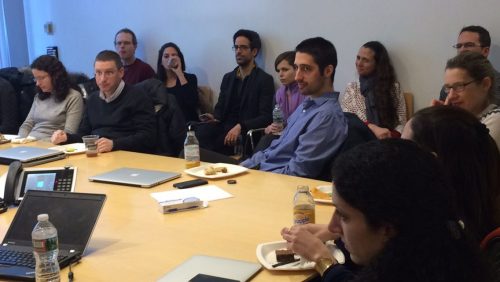A series of entrepreneurship meetings in North America held this week by the ScienceAbroad organization with the participation of hundreds of Israeli scientists aims to encourage scientists abroad to return to Israel

A series of entrepreneurship meetings with the participation of hundreds of Israeli scientists in four centers in North America that took place in January 2017 at the initiative of the Organization of Israeli Scientists Abroad - Sainsbrod (ScienceAbroad) and with the support of the Business Entrepreneurship Division of the Ministry of Immigration and Absorption, He made it his goal to give tools to hundreds and thousands of scientists, most of them postdoctoral students who went abroad after their doctorate, and to consider the entrepreneurial option as a way back to Israel. In the last two years alone, more than 600 Israeli scientists staying abroad and interested in returning to Israel have joined the lists of the Sainsbrod organization.
According to the CBS publications and the program for the repatriation of academics, it appears that 1860 PhD holders have been abroad for 3 years or more, of which over 50% of the postdoctoral students are in the fields of life sciences. Only about 9% of PhD holders in life sciences work in industry and agriculture, only 7% of PhD graduates in life sciences are accepted as faculty members in academia and 9% in industry and agriculture.
The data shows that today one out of ten people who received a PhD in Israel lives abroad, as well as about a quarter of those who received a PhD in mathematics, 18.3% of those who received degrees in computer science, 17.5% of those who received degrees in biology or aeronautical engineering, and about 16% of those who received degrees in chemistry, physics , in biochemistry and genetics.
Moreover, according to the CBS data in 2015, 27,826 Israelis with a first, second or third degree lived abroad and that the rate of returning academics is lower than the number of those moving abroad. One of the main reasons for scientists moving abroad is for a postdoctoral period, which is required of PhD recipients in Israel as a condition for a career in research. Also, most of the young researchers who are hired abroad will find it difficult to return due to a lack of standards in the research universities.
This week the Sainsbrood organization held four entrepreneurship events with the aim of motivating the scientists to turn to entrepreneurship as another channel to return to Israel. The meetings took place at McGill University in Montreal, the Israeli Consulate in Chicago, the Broad Institute in Cambridge, Boston and the NYU Medical Center in New York. The purpose of the entrepreneurship fair is to expose Israeli scientists abroad to the option of entrepreneurship as a career - either by opening their own company or by joining innovation departments in companies in the industry. CEO of the organization Monica Lev Cohen Emphasizes that the goal is to take your idea, register copyright on it and develop it for an independent company or sell it to a company that would like to develop it. The entrepreneur participated in the meetings Dr. Neta Kela (PhD in immunology from the Weizmann Institute, postdoctoral fellow at Stanford in the field of cancer, founded a start-up in the oncology field (CELLACTOR), which specializes in product development, innovation and entrepreneurship in the field of biotechnology and medicine and advises international and local companies in the scientific and business fields, winner of the McCormick Award from Stanford University and a partner in more than ten publications and patents). In addition, an explanation of the plans of the state and the Ministry of Immigration and Absorption to encourage business entrepreneurship, benefits that can be received and information on fundraising and corporate taxation in Israel will be presented at the meetings.
The organization of Israeli scientists abroad Science Abroad (ScienceAbroad) formerly BioAbroad (BioAbroad) is a non-profit organization operating since 2006, to maintain contact with Israeli scientists and researchers around the world. The organization is an international community for Israeli researchers staying abroad and has 2,300 academics with a master's degree or higher as members. The organization is today the largest network for Israeli scientists, researchers, engineers, doctors and entrepreneurs staying abroad. The organization fosters an active social-professional network connected to academia, industry, society in Israel and the local communities where its members are located, and supports members who wish to return to Israel. The organization operates 21 centers at leading universities in North America and a diverse online activity. The organization has over two thousand members scattered in 22 countries.

2 תגובות
A good enough reason to speed up space research and industry in Israel. This is a tremendous economic leverage. As someone who knows the subject, 50,000 - 40,000 people in Israel can engage in this way. You only need to want and without stuttering. A small example. There is no reason not to launch a 50 kg spacecraft from Israel to the moon. All the technology is there. It does not require breakthrough technologies. Rough estimate within a year to a year and a half from the day to carry out the launch. The name of the game is vision.
I was a member of the organization when I was at Stanford, back when it was called BioAbroad, thanks to the organization I created an amazing network of contacts, today I am a researcher in academia and think that entrepreneurial skills are also necessary for those who manage to integrate into academia. Kudos to Sainsbrod, I'd be happy to help